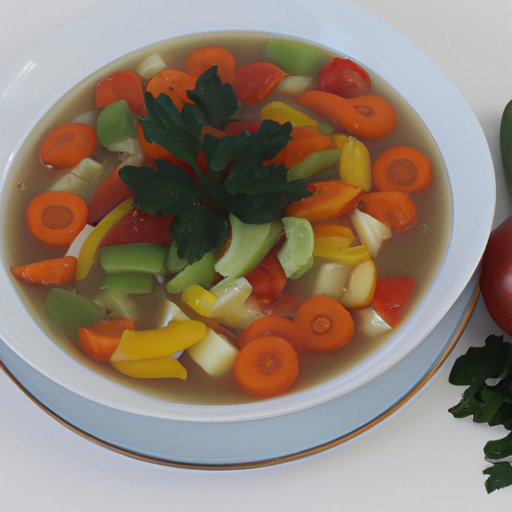Introduction
Vegetable soup is a comforting, classic dish that can be enjoyed as part of a healthy diet. It’s typically made with a variety of vegetables, broth, and seasonings. This simple dish is incredibly versatile and can be adapted to suit individual tastes and dietary preferences.
Vegetable soup is packed with vitamins and minerals and is low in calories. It can also provide fiber and protein when combined with other ingredients. In this article, we’ll explore the health benefits of vegetable soup, what vegetables you should include in your soup, and how to make it a meal.
Nutritional Benefits of Vegetable Soup
Vegetable soup is a good source of vitamins and minerals. Depending on the ingredients used, it may contain vitamins A, C, and K, as well as B vitamins, calcium, iron, and magnesium.
It’s also high in fiber. According to a study published in the journal Nutrients, “Soups have the potential to be rich sources of dietary fiber.” The study found that one cup of vegetable soup contains 4.7 grams of fiber on average.
Vegetable soup is also low in calories. An average cup of vegetable soup contains just 80 calories. This makes it a great option for those looking to lose weight or maintain their current weight.

The Healthiest Way to Make Vegetable Soup
The healthiest way to make vegetable soup is to focus on choosing the right vegetables, avoiding added sugars and fats, and using healthy cooking methods. Here are some tips to help you get started:
Choose the Right Vegetables
When making vegetable soup, focus on nutrient-rich vegetables such as carrots, celery, onions, peppers, tomatoes, and leafy greens. You can also add squash, potatoes, and sweet potatoes for extra flavor and texture.
Avoid Added Sugars and Fats
When making vegetable soup, it’s important to avoid adding sugar or fat. Instead, use herbs and spices to add flavor to the soup. If you’re using canned vegetables, look for ones that are labeled “low sodium” or “no salt added.”
Use Healthy Cooking Methods
To keep the soup healthy, use healthy cooking methods such as steaming, boiling, or simmering. Avoid deep-frying or roasting the vegetables, as these methods add extra fat and calories.
What Vegetables Should You Include in Your Soup?
There are many different types of vegetables you can include in your vegetable soup. Common ingredients include carrots, celery, onions, peppers, tomatoes, and leafy greens. You can also add squash, potatoes, and sweet potatoes for extra flavor and texture.
To make the soup even more nutritious, consider adding nutrient-rich additions such as broccoli, cauliflower, kale, spinach, mushrooms, and zucchini. Adding legumes such as beans and lentils is also a great way to increase the protein content of the soup.
How Much Vegetable Soup Should You Eat?
The recommended serving size for vegetable soup is one cup per day. This amount provides approximately 4.7 grams of fiber, 80 calories, and a range of vitamins and minerals. Eating more than one cup per day is not necessarily unhealthy, but it’s best to stick to the recommended serving size if you’re trying to lose weight or maintain your current weight.

How to Make Vegetable Soup a Meal
To make vegetable soup a meal, consider adding protein sources such as beans, lentils, tofu, and lean meats. You can also add whole grains such as quinoa, barley, or brown rice for extra fiber and nutrients.

Vegetable Soup as Part of a Healthy Diet
Vegetable soup is a nutritious and versatile dish that can be enjoyed as part of a healthy diet. To reap the full benefits of this dish, it’s important to eat a variety of foods and ensure you’re getting a balance of nutrients. Eating a wide variety of fruits, vegetables, whole grains, and lean proteins is essential for optimal health.
Conclusion
Vegetable soup is an incredibly nutritious and versatile dish. It’s packed with vitamins and minerals and is low in calories. To make it a healthy meal, focus on choosing the right vegetables, avoiding added sugars and fats, and using healthy cooking methods. Additionally, it’s important to remember to eat a variety of foods and ensure you’re getting a balance of nutrients.
In summary, vegetable soup is a nutritious and tasty dish that can be enjoyed as part of a healthy diet. With the right ingredients and cooking methods, it can provide a range of vitamins and minerals and help you reach your health goals.
(Note: Is this article not meeting your expectations? Do you have knowledge or insights to share? Unlock new opportunities and expand your reach by joining our authors team. Click Registration to join us and share your expertise with our readers.)
